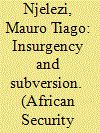|
|
|
Sort Order |
|
|
|
Items / Page
|
|
|
|
|
|
|
| Srl | Item |
| 1 |
ID:
184183


|
|
|
|
|
| Summary/Abstract |
A violent extremist group poses a significant threat to parts of Cabo Delgado province. Since its first major attack in October 2017, it has perpetuated a conflict to the detriment of sections of the population and government, as well as disrupting economic development. Little is known about the group and there is a considerable amount of confusion in policymaking and academic circles about the nature of the violent extremists (VE) and their relationship to the wider global Salafi-Jihadi community. By analysing the theological underpinnings of VE and their action in Cabo Delgado (CD), we bring clarity to this debate to enable international actors and policymakers in Mozambique navigate the complexities of the situation. From this analysis we conclude the following: VE are not Salafi-Jihadis as they do not share their ideological and theological understanding of the world. It is more accurate to present VE as challengers to the established order. Their struggle is best understood as a challenge to authorities to secure increased political and religious representation, and socio-economic benefits in CD.
|
|
|
|
|
|
|
|
|
|
|
|
|
|
|
|
| 2 |
ID:
189279


|
|
|
|
|
| Summary/Abstract |
Resulting from several social, political, economic and above all radical Islamic factors, the armed conflict in Cabo Delgado raised a variety of questions in the national and international system, among them the modus operandi of the group, now called Ahlu Sunnah Wa-Jammá. Thus, the present article analyses the way in which the modes of insurgency and subversion help to understand the modus operandi of the Ahlu Sunnah Wa-Jammá. For this purpose, a methodological study was established in which the semi-structured interview technique involved officers and documentary analysis for data collection. The results of the study show that the modus operandi of the Ahlu Sunnah Wa-Jammá is circumscribed to the organisation of numerous semi-autonomous cells which carry out guerrilla, terrorist and subversive actions. Furthermore, it was highlighted that the conflict was initiated by a minority of individuals subordinate to a radical religious ideology, and the objective of its operationalisation, until then, was carried out in three phases: preparatory, agitation and insurrection.
|
|
|
|
|
|
|
|
|
|
|
|
|
|
|
|
| 3 |
ID:
192951


|
|
|
|
|
| Summary/Abstract |
On 23 June 2021, after months of deliberations, the Southern African Development Community (SADC) approved the establishment of the SADC Mission in Mozambique (SAMIM) in response to escalating violent extremism and insurgency by an Islamist armed group, Al-Shabaab or Al-Sunnah wa Jama’ah (ASWJ), in Mozambique’s northern Cabo Delgado province, which posed the risk of regional contagion. SAMIM was deployed under scenario 6 of the African Standby Force (ASF) with a mandate focused on supporting the Mozambican government to combat terrorism and violent extremism in Cabo Delgado. Its mandate also centred on strengthening and maintaining peace and security; restoring law and order; and assisting the government and humanitarian agencies to provide humanitarian relief to the affected population. This paper contributes to raising public understanding of the regional and continental policies and principles underpinning the SADC decision-making process regarding the deployment of peace missions and the effectiveness of SAMIM in fulfilling its mandated tasks until its first anniversary. It identified the relative pacification of Cabo Delgado as a crucial strategic and operational impact of SAMIM’s exceptional military intervention, which facilitated its segue into a multidimensional peacebuilding mission. Six principal constraints-cum-opportunities of SAMIM, which had a significant bearing on its effectiveness, are discussed.
|
|
|
|
|
|
|
|
|
|
|
|
|
|
|
|
|
|
|
|
|